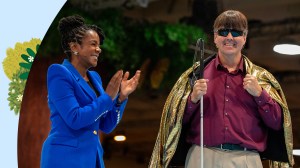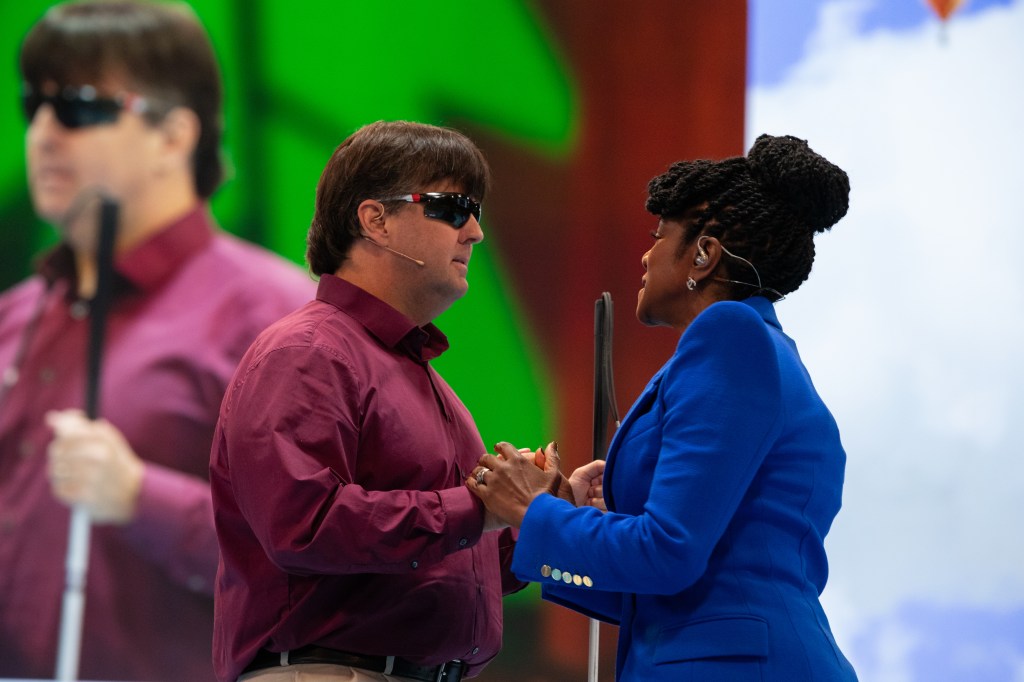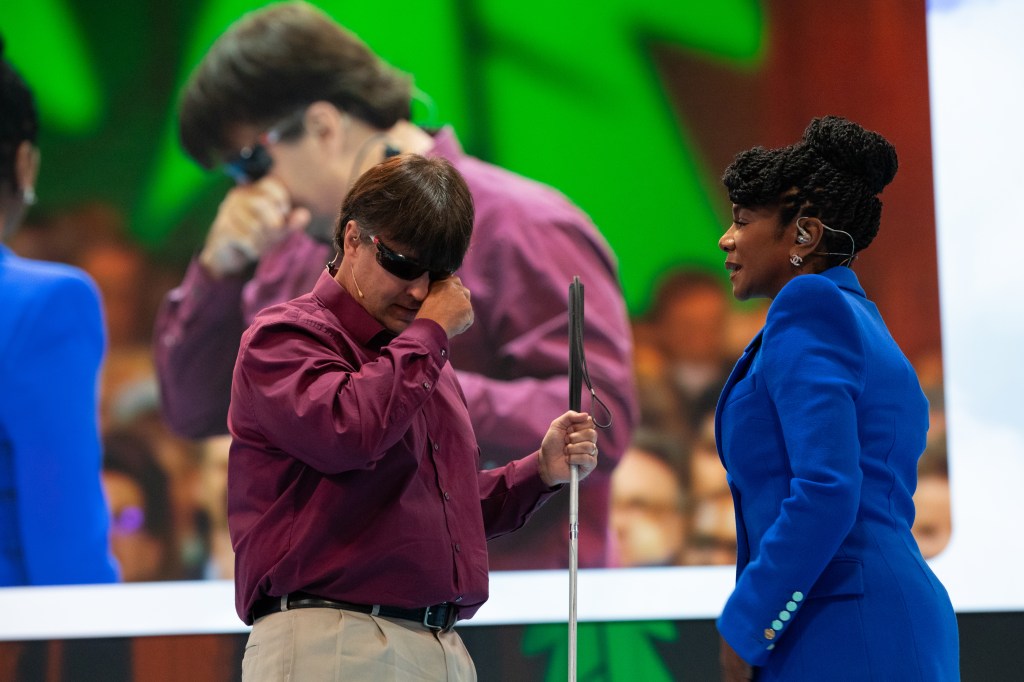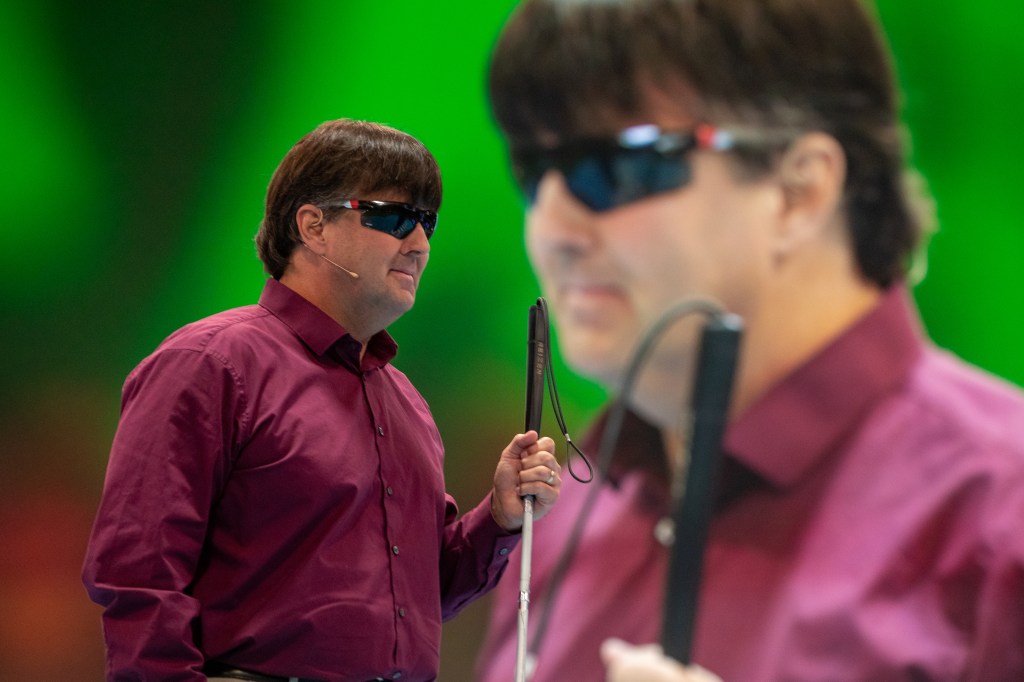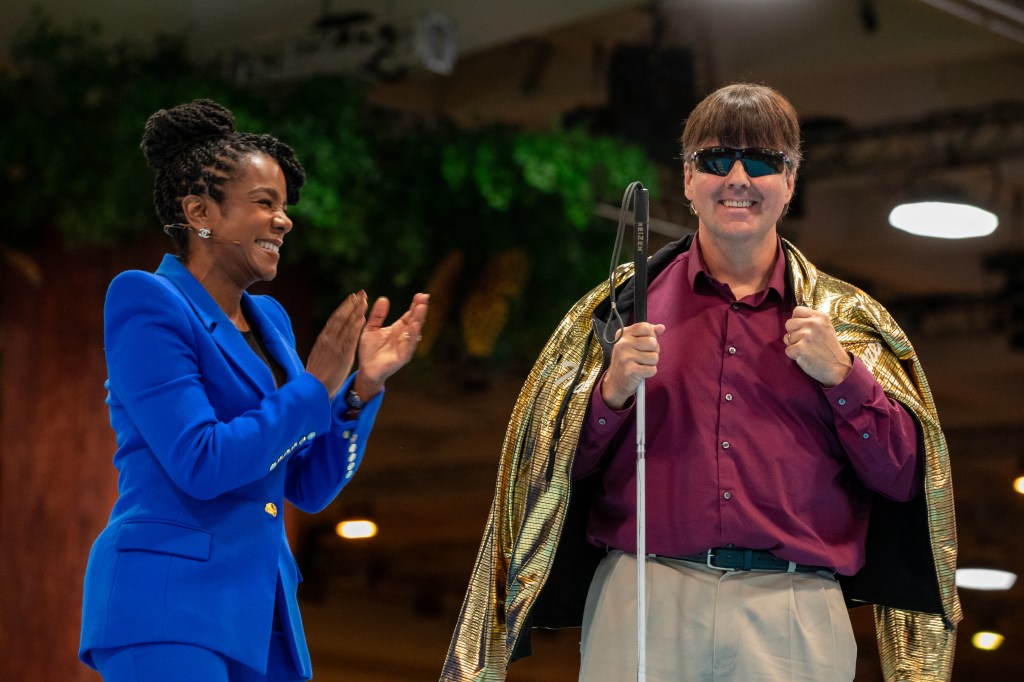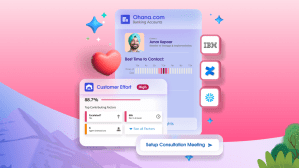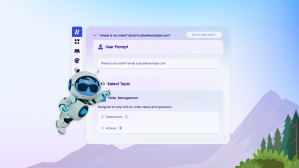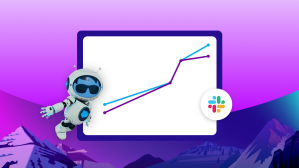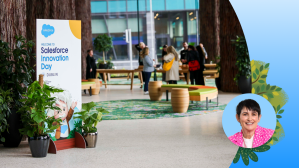Quick take:
- Legally blind since childhood, Trailblazer and Golden Hoodie winner Mike Hess leveraged his successful career and experience to found the Blind Institute of Technology (BIT).
- BIT, a global nonprofit staffing and recruiting agency exclusively dedicated to professionals with disabilities, joined forces with Salesforce’s Workforce Navigators program to make careers in tech more accessible.
- Together, BIT and Salesforce are working to close the employment gap for people with disabilities.
As a young child, Mike Hess had no idea what being “blind” meant. It was something that his mom and doctors said would soon affect him, but the true nature of being blind was far beyond his mind’s grasp.
And although Hess grew up knowing his sight would continue to fail, he put off that reality as long as possible. As he entered the workforce, Hess would even pretend to be sighted when interviewing for jobs.
“Growing up, the systemic stigma of being part of the blind community was pretty bleak. I heard about social security and disability. Career guidance was to stay on government assistance,” shared Hess. “I needed to get a job. I was married with two kids. So I was afraid to share my disability until after I had a job offer.”
I needed to get a job. I was married with two kids. So I was afraid to share my disability until after I had a job offer.
Mike Hess, founder of the Blind Institute of Technology
As his degenerative retinal disease worsened in his early 20s, Hess could no longer “fake” it. He struggled with the concept. And he began to wonder, “Why am I blind?”
Finding purpose in pain
That question remained unanswered over the next 20 years as Hess built a successful career in the private tech sector. During that time, however, Hess shared that he always felt like the “token blind guy.”
“Even after making it into corporate America and succeeding, there’s this internal conversation in your head saying you don’t deserve to be there,” said Hess.
Even after making it into corporate America and succeeding, there’s this internal conversation in your head saying you don’t deserve to be there.”
Mike Hess, founder of the Blind Institute of Technology
The feeling left him again thinking about the “why” of his disability. Was there something he could do to help others in a similar position?
Fueled in part by this question, Hess decided to take a bold new step. He left his career to pursue a greater purpose: leveraging his experience with blindness in the workforce to help others.
A new purpose, forged from a career’s worth of insight
In 2013, Hess founded the Blind Institute of Technology (BIT), with a goal of reducing the unemployment rate for the blind and visually impaired community.
“One of the greatest untapped human resources on the planet is the blind and visually impaired community, and broader disability community,” said Hess.
Statistics support that claim. According to the Bureau of Labor Statistics, in 2019, fewer than 20% of people with a disability were employed. This disparity extends to people who are blind; with unemployment among this group at 10%, about double the national average.
Hess saw an opportunity to close this gap by ensuring technology training was fully accessible. His experience gave Hess a unique perspective about the potential of people like him to succeed with the right tools.
“Less than 10% of websites globally are accessible digitally with screen readers,” shared Hess. “Technology has the ability to level the playing field, in turn providing more employment opportunities.”
Building upon that simple truth, Hess, at the helm of BIT, set about to do just that. Already familiar with the Salesforce platform, Hess designed a virtual training series to enable anyone, anywhere in the world, regardless of visual impairment, to become a Salesforce admin.
Partnering for good
Around the same time, Salesforce’s Office of Accessibility was launching a new workforce development program. Workforce Navigators aimed to support job seekers with disabilities who were interested in a career in the Salesforce ecosystem.
But, the company could not do it alone. Sarah Mark, Senior Program Manager of Workforce Navigators at Salesforce, needed to partner with a nonprofit focused on employment for people with disabilities — and it wasn’t easy to find.
“We started the program right when COVID-19 hit. It was difficult to plan and launch it when everyone was focused on adjusting to a new way of life brought about by the pandemic,” she explained.
After she became aware of BIT, though, Mark knew they had found the right partner. “When I met with Mike, I learned that he had already been successful in running a training series for Salesforce Admins in a completely virtual environment. He was confident they could facilitate training regularly and sustainably,” she said.
A successful partnership built on shared values
Today, BIT is the strategic partner for Workforce Navigators, providing a diverse talent pipeline to the Salesforce ecosystem. BIT is responsible for facilitating the training offered through Workforce Navigators, while Salesforce employees may volunteer to mentor trainees. Working closely with the Workforce Navigators team, BIT also created customized Trailhead instructions for screen readers to enable a more seamless experience for blind and low vision professionals.
“BIT has been an incredible partner,” said Catherine Nichols, VP of the Office of Accessibility at Salesforce. “We’re thrilled to have found an organization so aligned with the values of the Office of Accessibility — to create an even playing field in the world for people with disabilities. We can’t accomplish this alone, so we’re thrilled to have Mike and his team at BIT by our side.”
We’re thrilled to have found an organization so aligned with the values of the Office of Accessibility — to create an even playing field in the world for people with disabilities.”
Catherine Nichols, VP of the Office of Accessibility
Just three years into the launch of Salesforce’s Workforce Navigator’s program, 141 job seekers have completed training (26 Salesforce have been certified), and 33 have been placed with employment. Hess credits the technology platform and company’s alignment with his own values.
“I chose the Salesforce platform because the company has a solid understanding of the importance of accessibility. They welcome blockers encountered and prioritize resolving any issues we find related to accessibility,” said Hess.
Finding new opportunities with AI
Today, Hess and Salesforce are focused on the future: artificial intelligence (AI). Perhaps most importantly, they’re looking at how this technology can help continue their mission of closing the disability employment gap.
“From the beginning of design, Salesforce embeds accessibility into its technology. If AI is leveraged effectively, we can get clear descriptions of what a visual picture actually looks like. Salesforce and AI have the ability to allow people like me to take their career to the next level,” Hess said.
Salesforce and AI have the ability to allow people like me to take their career to the next level.”
Mike Hess, Trailblazer, Golden Hoodie winner, and founder of the Blind Institute of Technology (BIT).
And at AI’s biggest event, Dreamforce 2023, Hess was awarded one of the highest honors in the Salesforce Trailblazer Community: a Golden Hoodie. The award recognizes those who exemplify inspiration and innovation — a perfect fit for someone who has dedicated his career to helping others with technology.
“Me standing on the Dreamforce stage was a historic moment in time for all people with disabilities,” said Hess. “Marc Benioff said business is the greatest platform for change. For this community, that change means commitment to digital equity. Salesforce was the first tech company to commit to digital equity. In 10 years, I’ll look back and remember this moment as the game changer that made it happen.”
Hess has long since stopped questioning why he is blind.
“I found the reason,” he said. “I was born blind to truly help create equity, true equity for professionals with disabilities.”
More information:
- Read about the Salesforce Workforce Navigator program
- For more on BIT, go here
- Read more news and stories from Dreamforce 2023
